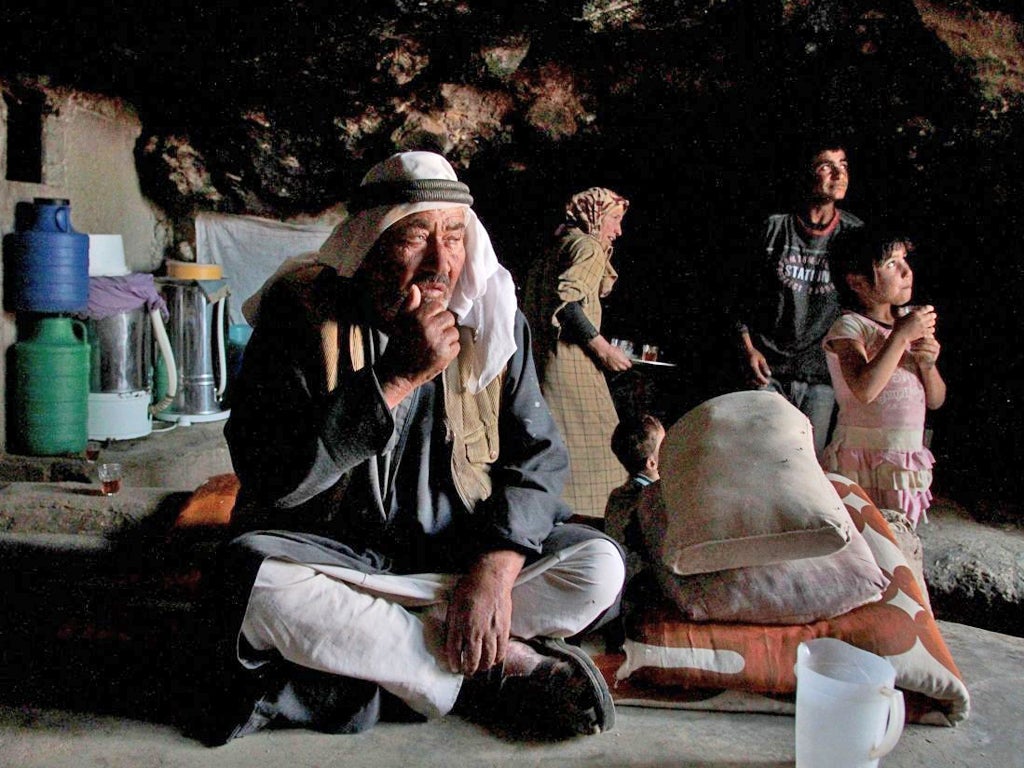Palestinian cave dwellers caught in Israel's crossfire
Villagers face eviction from a bitterly contested border area that was designated as a military zone

Your support helps us to tell the story
From reproductive rights to climate change to Big Tech, The Independent is on the ground when the story is developing. Whether it's investigating the financials of Elon Musk's pro-Trump PAC or producing our latest documentary, 'The A Word', which shines a light on the American women fighting for reproductive rights, we know how important it is to parse out the facts from the messaging.
At such a critical moment in US history, we need reporters on the ground. Your donation allows us to keep sending journalists to speak to both sides of the story.
The Independent is trusted by Americans across the entire political spectrum. And unlike many other quality news outlets, we choose not to lock Americans out of our reporting and analysis with paywalls. We believe quality journalism should be available to everyone, paid for by those who can afford it.
Your support makes all the difference.Generations of Jabareens, a Palestinian family, were born in the cave hewn into the rugged hillside just a few miles from the Green Line delineating the occupied West Bank from Israel. Over the decades, the cave has acquired a few comforts, including generator-run electricity, a door offering protection against the elements, and a toilet installed at the expense of the British government.
The Jabareens, though, are all too aware this rough comfort is transient. Ever since Israel declared this area a live firing zone in the 1970s, they have lived under threat of eviction. That situation is now coming to a head.
Israel's Defence Ministry is to rule on the fate of the Palestinian communities within days, a decision that will then come up before the Supreme Court before a final ruling. Activists anticipate that the government will demand the total or partial expulsion of the 12 impoverished farming villages, home to some 1,600 people, that lie within the firing zone, a designation that rights groups say is a land grab concealed as a security need.
"We don't have any other land to go to," says Khaled Jabareen, 41, whose family's cave is surrounded by makeshift homes and farmsteads scattered on the hillside.
A Defence Ministry official declined to be drawn on its position, saying that there was, as yet, "no concrete decision on the matter". In 1999, Israel evacuated the villagers by force, demolishing homes and property. A year later, the Supreme Court said the farmers could return, pending a final decision, abandoning them to a state of limbo. In the interim, the Palestinians have fought a Second Intifada, and Israel has erected a separation barrier confining most Palestinians to the West Bank, and cutting them off from job opportunities in Israel. As a result, young men from these communities are returning to what their forefathers did best: working the land.
Over the years, the villages, located in one of the most arid parts of the West Bank, have expanded, and Britain's Department for International Development has funded the construction of dozens of toilets and water cisterns to collect rainfall as part of humanitarian assistance projects. All of these are facing demolition orders.
In a recent statement, the Foreign Office minister Alistair Burt censured Israel, saying that demolitions and evictions "cause unnecessary suffering to ordinary Palestinians; are harmful to the peace process; and, in all but the most limited circumstances, are contrary to international humanitarian law."
The battle over toilets and cisterns is a reminder of the grinding nature of the Israeli-Palestinian struggle for land, where parts of the West Bank, particularly areas close to the 1967 Six-Day War border, remain bitterly contested.
Israel claims the farmers are not permanent residents, living in the villages for only some of the year. But the Palestinians assert that some families remain year-round, while those farmers who move here in the spring spend more than six months in their villages.
And international patience is running out. EU foreign ministers are expected to issue a resolution condemning Israeli policy towards Palestinians in the West Bank and denouncing settler violence, Haaretz reported. Israel has warned that the move would complicate peace negotiations.
For Hamid Jabareen, 72, the larger struggle for an independent Palestinian state is unimportant. He just wants to remain in his home. "It's my land, the land of my father, my grandfather," he says simply, adding that the more Israel tries to move him, the deeper he will "dig and dig".
Join our commenting forum
Join thought-provoking conversations, follow other Independent readers and see their replies
Comments